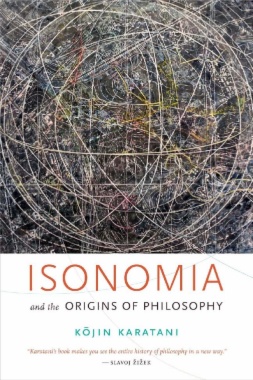In Isonomia and the Origins of Philosophy—published originally in Japanese and now available in four languages—Kōjin Karatani questions the idealization of ancient Athens as the source of philosophy and democracy by placing the origins instead in Ionia, a set of Greek colonies located in present-day Turkey. Contrasting Athenian democracy with Ionian isonomia—a system based on non-rule and a lack of social divisions whereby equality is realized through the freedom to immigrate—Karatani shows how early Greek thinkers from Heraclitus to Pythagoras were inseparably linked to the isonomia of their Ionian origins, not democracy. He finds in isonomia a model for how an egalitarian society not driven by class antagonism might be put into practice, and resituates Socrates's work and that of his intellectual heirs as the last philosophical attempts to practice isonomia's utopic potentials. Karatani subtly interrogates the democratic commitments of Western philosophy from within and argues that the key to transcending their contradictions lies not in Athenian democracy, with its echoes of imperialism, slavery, and exclusion, but in the openness of isonomia.
- Cover
- Contents
- Translator’s Note
- Map
- Author’s Preface to the Japanese Edition
- Introduction
- Universal Religion
- Ethical Prophets
- Exemplary Prophets
- Chapter 1: Ionian Society and Thought
- Athens and Ionia
- Isonomia and Democracy
- Athenian Democracy
- State and Democracy
- Colonization and Isonomia
- Iceland and North America
- Isonomia and Council
- Chapter 2: The Background of Ionian Natural Philosophy
- Natural Philosophy and Ethics
- Hippocrates
- Herodotus
- Homer
- Hesiod
- Chapter 3: The Essential Points of Ionian Natural Philosophy
- The Critique of Religion
- Self-Moving Matter
- Poiesis and Becoming
- Chapter 4: Post-Ionian Thought
- Pythagoras
- Heraclitus
- Parmenides
- Post-Eleatics
- Chapter 5: Socrates and Empire
- The Athenian Empire and Democracy
- Sophists and Rule by Rhetoric
- The Trial of Socrates
- The Riddle of Socrates
- Daimon
- The Socratic Method
- Plato and Pythagoras
- The Philosopher-King
- Isonomia and the Philosopher-King
- Appendix
- From The Structure of World History to Isonomia and the Origins of Philosophy
- Timeline of the Ancient World
- Notes
- Bibliography
- Index
- A
- B
- C
- D
- E
- F
- G
- H
- I
- J
- K
- L
- M
- N
- O
- P
- R
- S
- T
- U
- W
- X
- Y
- Z

